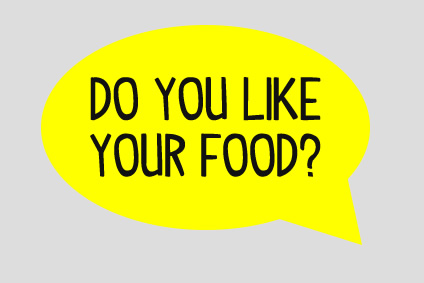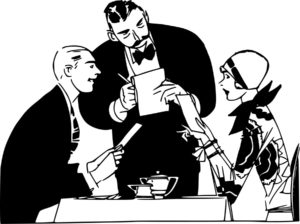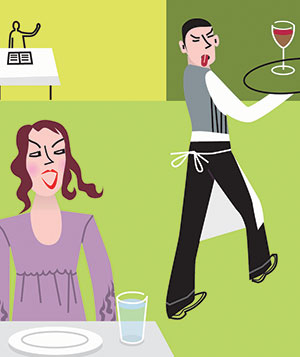One of the most difficult aspects of waiting tables is learning to handle people’s questions at the table without always saying what you really feel. If you want to keep your job, you have to learn how to censor yourself. It’s not easy to keep your composure when you’re being assaulted by stupid questions or to hide how annoyed you are when someone says something upsetting. Offering candid opinions about the menu or being too blunt with guests can be also be dangerous as it can be construed as your being confrontational. So, maybe out of necessity, waiters learn to develop a secret language to artfully conceal what we really mean.
Here is an interaction you will never hear in a restaurant:
Guest: “How is the special Sea Bass?”
Waiter: “It’s probably not very fresh–we’ve been running it as a special for the last week and it hasn’t been selling well. I would not order any fish here.”
More likely it will sound more like this:
Guest: “How is the special Sea Bass?”
Waiter: “People love it but I think if I had to choose I’m a little partial to the meat dishes on our menu.”
Learning how to decode this “waiter-speak” will help you understand the hidden meaning behind what your waiter is saying so you understand what he’s really trying to tell you. Here are some of the most common phrases you’ll hear waiters say followed by a translation of each:
WAITER SAYS: “That’s definitely one of our most popular items.”
TRANSLATION: It’s not one of my favorites.
Waiters will always try to avoid saying anything negative about the food. When you ask about something on the menu and the waiter tells you it’s “popular” it shows an unwillingness to personally endorse the dish. If he likes it, why wouldn’t he just say so? Consider ordering something else. Better yet, probe the questioning further and hopefully you will learn his favorites. Another warning sign is if he makes some other commentary on the dish to avoid taking a position. Eg. If you ask if something is good and he replies “It’s very rich.” (read: I think it’s too heavy) If he answers your question with another question, it can also be a warning sign that he is trying to guide you elsewhere. Eg. “It depends…Do you like spicy food?” (read: I get complaints that it’s too spicy and I don’t want you to send it back.)
WAITER SAYS: “Would you like anything to start?”
TRANSLATION: Your order sucks.
It’s bad form for waiters to come out and say it—“You haven’t ordered enough.” We understand that every time you go out you and your grandmother split an entree but we have bills to pay. Most servers are trained to address a deficient order by indirectly prompting you to augment the with appetizers, side dishes, etc. You will probably continue to insist that you’re not very hungry and your waiter will continue to think that you are just trying to save money. Since most waiters work for tips and the tips are directly related to a percentage of sales, we must find tactful ways to guilt you into ordering more food. If you don’t comply, we will retaliate by trying to turn your table as fast as possible so someone who orders acceptably can sit down in your place.
WAITER SAYS: “Can I get you anything else?”
TRANSLATION: Get out.
We can’t just ask you to leave. But you see those fifty people waiting at the bar? Yeah, they are waiting for you to pay your check. It’s heartwarming that you and your friends haven’t seen each other since your days in boarding school but try explaining that to the hungry people waiting over 45 minutes past their reservation time. You probably won’t get the hint but waiters will offer you something else to make you feel like you are welcome to stay. They are really offering you the door.
WAITER SAYS: “Sorry for the delay, there was some miscommunication in the kitchen about your order.
TRANSLATION: I totally fucked it up.
Waiters don’t like to take ownership of their mistakes so they will usually pin blame on someone else. Since the kitchen is typically hidden behind closed doors, it’s usually safe to say it’s their fault without getting caught. Shamelessly throwing the chef under the bus to save our hide is a desperate strategy but sometimes we have no alternatives. And some of us will do anything to avoid taking responsibility so we can salvage a decent tip. Don’t judge.
WAITER SAYS: “It’s a pretty dry, full-bodied wine.”
TRANSLATION: I’ve never tasted it.
Describing wines in vague terms is a technique waiters use when they don’t know anything about the wine you’re asking about. Beware of waiters that use vague words to describe wines like smooth, elegant, round, fruity or velvety. They will do their best to fake their way through it to sound knowledgeable. Go ahead, let them wax poetic about the wine’s “tannic grip”—then just order the Chianti.
WAITER SAYS: “Can I start you with still, tap, or sparkling water?”
TRANSLATION: I hope that if I hide tap between the two bottled options I can trick you into paying for water.
This is a classic waiter ploy. Does it really confuse people into ordering more bottled water? Probably not, but we do it anyway. Or we’re forced to do so by management. You will be annoyed and ask for regular water but, like bums spare-changing on the street, we will not be discouraged. A new sucker is born every day.
WAITER SAYS: “I’m sorry that table is reserved for another party.”
TRANSLATION: I don’t want you to move because then I will have to reset your table again.
It’s a colossal pain in the ass after we’ve already started a table and then they decide halfway through their appetizers that they HAVE TO have that corner booth so we have to reset everything. Every time you ask to move in restaurants, your waiter’s first thought is the inconvenience of having to change the entire place setting so he will do everything in his power to prevent you from moving.
WAITER SAYS: “I can ask the chef if he’ll make it for you.”
TRANSLATION: I am going to walk in and out of the kitchen pretending to ask the chef and then tell you no.
There is a good chance that the chef will be willing to accommodate whatever special request you have. Unfortunately, there is a better chance that the chef is buried with tickets and doesn’t want to be bothered by another waiter with another special request. Sometimes he says no just because he’s sick of special requests. You’re welcome to go ask him yourself if it’s so important to you but we’re not gonna take a bullet just so that your four-year old child can have plain pasta with butter.
WAITER SAYS: “Sorry for your food is taking so long. It’s on the way.”
TRANSACTION: I forgot to order it.
We thought we put in the order. Honestly. But then that cute hostess who just started last week came over and we got distracted. Once we finally realize how long you’ve been waiting, we check the POS. Oh shit! We panic, run to get a manager and makeup a story about how we put in the order but someone else must have canceled it when we forgot to hit “send” on the terminal. We take a deep breath, calmly walk over to your table and… lie to your face.
WAITER SAYS: “It’s hard to compare them, those are two of my favorite dishes.”
TRANSLATION: You are probably going to blame me if you don’t like which one I recommend so I’m not taking the bait.
We’re not gonna fall into that trap, buddy. Nice try. You will order what we recommend and then when we check back on your food you’ll act all brooding and make some passive-aggressive comment how you’re underwhelmed and maybe you’ll try the other dish next time. You will always end the conversation with “It’s ok, it’s not your fault.” Of course it isn’t.
WAITER SAYS: “We stay open until the last guest leaves.”
TRANSLATION: It’s time to go when we drop the check and turn the lights on.
Of course, we have to SAY you can stay as long as you like. You’ll smile and remark at how refreshing it is that the staff doesn’t rush you when it’s near closing time like so many other restaurants do. But we have to be back for brunch at 10 AM, bro. We’re not going straight home either. One of the guys in the kitchen is celebrating his last night and we’re going out for karaoke till at least 4 AM. So… “Can I get you anything else?” (Now you know what that means!) No? Didn’t think so.
WAITER SAYS: “I’m sorry I could not get an authorization on your credit card.”
TRANSLATION: “You’re broke, dude. Don’t even dare try to skimp on my tip.”
Do you have another card we can use? Hell no we don’t take Discover! Listen, it’s very touching that you’re treating your girlfriend to a fancy dinner for your anniversary and we hope you had a great time but it’s customary that when you finish your meal that YOU HAVE ENOUGH MONEY TO PAY FOR IT. Hopefully, after your new card is approved, you will overcompensate with a big tip to reassure present company about the state of your financial health. It’ll be our little secret.




